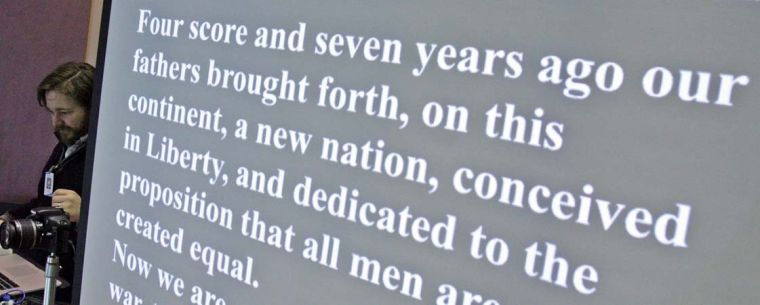04/01/2014
Address proves all speeches not created equal
FAIRBANKS — Seven score and 10 years ago, one of our most highly regarded American presidents spoke forth at Gettysburg 10 sentences that have reverberated since through the hallowed halls of our great nation’s history.
Standing on the site where, just a handful of months earlier, the two divided halves of the United States had waged the bloodiest battle of the American Civil War, Abraham Lincoln espoused in less than two minutes what others had struggled for years to state.
Lincoln’s speech, known today as the Gettysburg Address, expressed his desire that the men who died on the consecrated ground of that battlefield not have died in vain and his deep belief that all men are created equal.
As Lincoln stood at the podium on that November day in 1863, he both dedicated the ground of the battle site to those brave men who lost their lives and rededicated himself to the healing of a divided nation.
On that day, Lincoln’s speech was not the keynote address, but it is the one remembered — successfully putting words to a feeling Lincoln himself did not seem to think possible of expressing.
“The world will little note, nor long remember what we say here,” Lincoln said, “but it can never forget what they did here.”
Now, a century and a half later, Lincoln’s speech has defied his own expectations. The Gettysburg Address, regarded as one of the most influential speeches in American history, celebrated its 150th anniversary in November.
To commemorate that milestone, the Public Broadcasting Service has teamed up with documentarian Ken Burns to spread the meaning and resonance of Lincoln’s famed speech — and Fairbanksans of all ages can participate.
Fairbanks-based public radio and television station KUAC, in partnership with Burns and Washington, D.C., public television station WETA, is reaching out to students, parents, teachers and community members of all ages to record their own spoken version of Lincoln’s famed address.
Everyone is encouraged to memorize the address for their recording, which they can upload via www.kuac.org/theaddress, though committing the speech to memory is not required. The idea, according to KUAC’s Emily Berriochoa, is to imprint the historical significance of the speech on as many people as possible.
“I think if the kids truly memorize the address it’s something that will stay with them for a very long time,” Berriochoa said. “As the kids get older they’ll look back on that and understand what a big event that was in America’s history.”
Though much of the effort focuses on school-age children, Berriochoa said KUAC is hoping to get as many adults as possible. She had the opportunity to record former state Sen. Glenn Hackney’s rendition of the address recently. Hackney, who is 90 years old, has been reading and re-reading the address since he was in high school.
When Hackney was born, many people who may have remembered hearing Lincoln’s address were still alive. Today, the address persists as a memory of a memory, but its power remains.
Lincoln’s Gettysburg Address was not the main speech of the consecration, but at a mere 272 words it manages to dwarf the comparatively massive 13,000 word oration of Edward Everett.
KUAC is just one of the many organizations throughout the country working with people to record their own versions of the Gettysburg Address. Every living American president, Jimmy Carter, George H. W. Bush and George W. Bush, Bill Clinton and Barack Obama have all recorded their own versions of their predecessor’s speech for the campaign.
Others to have submitted recordings of the speech include members of Congress, television news anchors, comedians, musicians and actors. Anyone with a camera can join those politicians and celebrities by submitting their own video through April 15.
At 8 p.m. April 15, KUAC will air Burns’ documentary, titled “The Address,” on its television station. Burns’ documentary takes a close look at a school for special needs children in Vermont where each student memorizes and publicly recites Lincoln’s speech.
More information on how to participate in the program can be found online at www.kuac.org/theaddress.

No comments:
Post a Comment